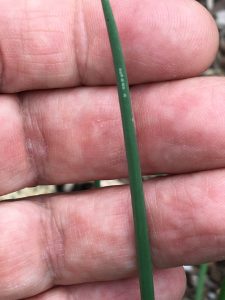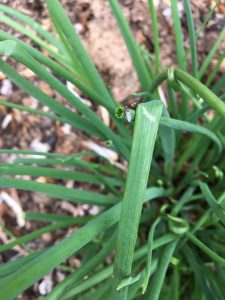Due to the low temperatures predicted this evening April 21, 2021, the New Jersey DEP has issued an Open Burning Permit for Agricultural Businesses.
Rutgers Cooperative Extension
Seasonal updates and alerts on insects, diseases, and weeds impacting vegetable crops. New Jersey Commercial Vegetable Production Recommendations updates between annual publication issues are included.
Subscriptions are available via EMAIL and RSS.
Quick Links:
 NJ Commercial Vegetable Production Recommendations
NJ Commercial Vegetable Production Recommendations
 Rutgers Weather Forecasting - Meteorological Information important to commercial agriculture.
Rutgers Weather Forecasting - Meteorological Information important to commercial agriculture.
Allium Leaf Miner
Allium leaf miner (ALM) feeding/egg laying scars continue to increase in chive plantings near Milford, Hunterdon County and Lawrenceville, Mercer County as of this Tuesday. Chives in home gardens in central Morris County and southern Cape May County were also found to be infested this past weekend, with adults actively flying in plants. The first (spring) flight of these flies appears well underway. Yellow sticky cards have captured low, but consistent (range 1-5/card/week) numbers of adults in Hunterdon and Mercer County plantings. Foliar insecticide applications temporarily suppress catches on the cards. Growers throughout the state should assume there is egg laying activity in their area currently.
 Growers should consider initiating (continuing) the control method of their choice at this time. Affected crops include chives, scallions, garlic, onions and leeks. Look for neat rows of white spots descending from the upper tips of allium leaves (see photo at left). Initial injury often occurs on the tallest leaves. Under warmer, less breezy conditions, adults may be seen near the tips of leaves (see photo of adults at lower right). Click on photos to enlarge the images.
Growers should consider initiating (continuing) the control method of their choice at this time. Affected crops include chives, scallions, garlic, onions and leeks. Look for neat rows of white spots descending from the upper tips of allium leaves (see photo at left). Initial injury often occurs on the tallest leaves. Under warmer, less breezy conditions, adults may be seen near the tips of leaves (see photo of adults at lower right). Click on photos to enlarge the images.
Floating row covers, kept on until this flight ends will help minimize access to plants. Insecticide applications targeting adults may be helpful as well, although weekly sprays have not stopped foliar injury. Spinosyn materials (Radiant, Entrust (OMRI approved)), pyrethroids (Mustang Maxx, Warrior), neonicotinoids (Scorpion, Venom), the diamide Exirel (section 2ee recommendation) and the insect growth regulator Trigard are labeled for leaf miner control.
Adult activity and observations of feeding will be reported on in the IPM Update as they occur. At this time, all growers should continue to respond to the first adult generation. We will attempt to identify the end of the first flight so that growers know when the risk of infestation has abated.
In an effort to increase participation in the COVID-19 vaccination program among farm workers, the Centers for Disease Control (CDC), through the national Extension Foundation, is working with Cooperative Extension across the country to help spread the word about the importance of getting vaccinated. Rutgers Cooperative Extension Director Brian Schilling has enlisted a team of County Agents and Specialists to answer the call from the CDC to participate in this EXCITE program. Through a variety of communications channels we will be providing informational posters and other educational materials in several appropriate languages that you can hand out or post in locations where your workers can easily read them (like on or near your Worker Protections Standards bulletin boards or in your labor camps).
“Vaccines (shots) are one of the tools we have to fight the COVID-19 pandemic” posters from the CDC are now available on the COVID-19 page of the Rutgers NJAES On-Farm Food Safety website <https://onfarmfoodsafety.rutgers.edu/covid-19-information/> with the direct links to these multiple language editions:
You can also share this Spanish language video <https://wecandothis.hhs.gov/un-rayo-de-esperanza> from the US Dept. of Health and Human Services with your workers to help explain where they can get more information about COVID-19 vaccines. There are several other informational videos available at https://wecandothis.hhs.gov/filter/format/Video, as well as posters/fliers from https://wecandothis.hhs.gov/filter/format/Poster%20%E2%80%93%20Flyer (mostly English), and factsheets at https://wecandothis.hhs.gov/filter/format/Fact%20Sheet.

This is the time of year when growers start to think about scheduling there USDA Harmonized and Harmonized Plus+ Audits. There have been changes to both audits which take affect May 1. Growers should download the latest versions from https://www.ams.usda.gov/services/auditing/gap-ghp/harmonized. The Harmonized Audit is version 2 dated February 8, 2021 and the Harmonized Plus+ with the same date is version 3. If anyone is still getting the GAP/GHP audits there are no changes.
There are changes to both the Harmonized and Harmonized Plus+. New questions for the Harmonized Audit include: G-8.2, G-10.7, G-12.1, G-12.2, P-3.1, P-8.2 and P-8.4. Amended questions include: G-3.2, G-10.1, G-10.3, G-10.6, G-10.8, G-10.10, G-10.12, G-10.16 and G-10.19. All of these apply to the Harmonized Plus+ in addition to four new questions: F-8.2.c, P-6.5.a, P-3.1.a and P-9.4.a. Two questions were also amended: G2.2.2 and G-6.1.a.
Other than the new questions which must be reviewed and addressed in the food safety plan there are certain things audits will be stressing this year. One is G-3.2 related to documentation and protection of those documents. Documents must be maintained for two years and be available for review. The one document which has not been assessed in the past is the portable toilet record. This year they will be checking for it. There are two ways growers can comply. First make sure the starting and ending dates are on your contract for the portable toilets. Also, take a picture of the log inside the toilet door at least at the end of the season. It may make sense to do it mid-season and at the end. Maintain those photos with your other documents.
The second is F-8.2 related to cleaning and sanitizing equipment, vehicles, tools and utensils and their storage. There needs to be a schedule for those activities and records must include the date and method of cleaning and sanitizing. One thing that gets overlooked at times are knives for field harvesting of vegetables and herbs. These must be included, and the auditors will be looking for the logs this year.
Example templates are being updated on the Food Safety website https://onfarmfoodsafety.rutgers.edu/ that will include most of what would be needed for an audit. These can be modified to fit any operation.
There is no argument that tractors have forever changed agriculture. The use of tractors has long replaced the presence of draft horses on almost every farm in America. It is estimated that cultivation of land with a modern tractor allows 64 acres to be plowed in the time it took to cultivate one acre with a draft horse. The use of tractors also comes with a dark side. As long as farmers have been using tractors they have been injured and killed by them. The Bureau of Labor Statistics reports 274 transportation related deaths, which includes tractor deaths in 2018. In any given year half of all tractor fatalities are from overturns, almost another one-fourth are from runovers. Many have a tradition of allowing extra passengers to ride on tractors. Sometimes trying to transport a worker from one task to the next or possibly saving them from walking back to the barn. Some even allow children to come along for a ride – a very dangerous practice. Whether it be on the tongue, side steps, fender or extra passenger in the cab, remember these places are not designed for riders. As we enter one of the busiest seasons in agriculture remember one of the most important safety rules NO SEAT, NO RIDER!
Do not ever think “it won’t happen to me.” Every farmer can tell a story of an incident that happened to someone they know in the farm community that involves a tractor. Make sure everyone makes it through the harvest – NO SEAT, NO RIDER!
Posted on behalf of Bill Bamka, Agricultural Agent, RCE-Burlington County.
Check out the Plant & Pest Advisory Organic Farm Advisory section which contains recommendations grounded in replicated trials and experience. These articles aim to support NJ commercial growers using organic methods.
Cooperating Agencies: Rutgers, The State University of New Jersey, U.S. Department of Agriculture, and Boards of County Commissioners. Rutgers Cooperative Extension, a unit of the Rutgers New Jersey Agricultural Experiment Station, is an equal opportunity program provider and employer.
Rutgers University is an equal access/equal opportunity institution. Individuals with disabilities are encouraged to direct suggestions, comments, or complaints concerning any accessibility issues with Rutgers web sites to: accessibility@rutgers.edu or complete the Report Accessibility Barrier or Provide Feedback Form.
Copyright © Rutgers, The State University of New Jersey, an equal opportunity, affirmative action institution
Copyright © 2026 · Generate Child Theme on Genesis Framework · WordPress · Log in